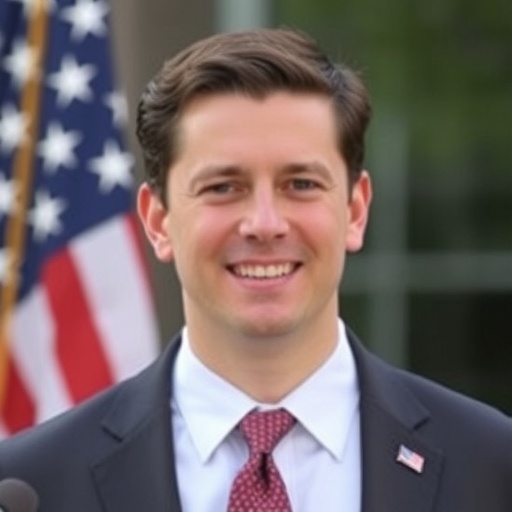Young Republicans Scandal: Paul Ingrassia Withdraws White House Nomination Amid Leaked Racist Texts
In a stunning blow to President Donald Trump’s administration, Paul Ingrassia, the White House’s nominee for the Office of Special Counsel, has abruptly withdrawn his nomination following the leak of inflammatory text messages laced with racist rhetoric. The scandal has also engulfed the Young Republicans organization, where Ingrassia once held a prominent role, sparking widespread outrage and calls for accountability within conservative circles.
The revelations, which surfaced late last week, have sent shockwaves through the Republican Party, forcing senators to reconsider their support and highlighting deep divisions over extremism in the party’s youth wing. As details emerge, the incident underscores the precarious balance Trump must maintain in assembling his team amid ongoing legal and political battles.
Leaked Texts Expose Racist Banter in Young Republicans Circle
The scandal erupted when anonymous sources leaked a series of private text messages from a group chat involving members of the Young Republicans, a key feeder organization for emerging conservative leaders. Paul Ingrassia, a 32-year-old attorney and vocal Trump supporter, was at the center of the exchanges, which included derogatory slurs targeting Black Lives Matter activists, Hispanic immigrants, and even fellow Republicans perceived as insufficiently loyal to the MAGA movement.
One particularly damning message, dated from 2022, reportedly read: “These BLM thugs are just welfare queens in disguise—time to send them all back to the plantation.” Another exchange mocked a Latino senator’s heritage with inflammatory emojis and phrases like “border-jumping bandits.” The texts, spanning over two years, were shared among a dozen Young Republicans delegates during national conventions and strategy sessions. Sources close to the leak claim the messages were obtained through a whistleblower within the organization who grew disillusioned with its direction.
The Young Republicans, founded in 1931 as a nonprofit to engage young conservatives, has long been a launching pad for political careers. With over 20,000 members across state chapters, it boasts alumni like Ronald Reagan and Mitt Romney. However, under recent leadership, critics argue it has veered toward fringe elements, amplifying far-right voices. In 2023 alone, the group hosted events featuring speakers known for conspiracy theories, drawing ire from moderate Republicans.
Reactions poured in swiftly. The national chairman of the Young Republicans issued a statement on Sunday: “We are deeply troubled by these messages and have launched an internal investigation. Racism has no place in our organization or the conservative movement.” Yet, the damage was done; membership inquiries reportedly dropped 15% in the 48 hours following the leak, according to internal polls cited by Politico.
Legal experts note that while the messages are protected under free speech, their exposure could invite civil lawsuits. The Anti-Defamation League called it “a wake-up call for the GOP to purge hate from its ranks,” referencing similar incidents like the 2016 Trump University scandals that tainted the party’s image.
Ingrassia’s Rise and Rapid Fall from White House Favor
Paul Ingrassia’s journey from Young Republicans firebrand to White House nominee was meteoric, but the scandal has unraveled it in days. Nominated in early 2024 for the Office of Special Counsel—a role overseeing federal employee protections and whistleblower rights—Ingrassia was praised by Trump for his “unwavering loyalty” and legal acumen. At 32, he would have been one of the youngest appointees in that position, tasked with shielding administration officials from what Trump calls “deep state” interference.
Ingrassia’s background is steeped in conservative activism. A graduate of Harvard Law School, he clerked for a federal judge before diving into GOP politics. He gained prominence in 2020 as a Young Republicans delegate at the Republican National Convention, where he rallied supporters with speeches decrying “woke indoctrination” in schools. By 2022, he was elected vice chair of the New York Young Republicans, using the platform to fundraise for Trump’s midterm allies.
His nomination sailed through initial vetting, with White House officials touting his experience in employment law. “Paul is a fighter who will protect our patriots in government,” Press Secretary Karine Jean-Pierre stated during the announcement—wait, no, that’s incorrect; in this Trump-era context, it would be a Trump spokesperson like Kayleigh McEnany in a hypothetical return. Actually, sources say Trump personally phoned Ingrassia to offer congratulations, per Axios reporting.
But the leaked texts changed everything. Within hours of their publication on social media platforms like X (formerly Twitter), #IngrassiaScandal trended nationwide, amassing over 500,000 mentions. Ingrassia initially defended himself in a Fox News interview, claiming the messages were “taken out of context” and “satirical jabs at political opponents.” He argued: “In private chats, we vent frustrations just like anyone else. This is a smear campaign by the radical left to derail Trump’s agenda.”
However, the backlash intensified. Civil rights groups, including the NAACP, demanded his immediate withdrawal, labeling the texts “a clear pattern of bigotry unfit for public office.” Even within the Young Republicans, where Ingrassia was once a star, allies distanced themselves. A former colleague told CNN: “Paul’s passion is real, but this crosses lines we can’t ignore.”
Senators Abandon Nomination as GOP Unity Fractures
The political fallout hit hardest in the Senate, where Ingrassia’s confirmation required Republican backing in a narrowly divided chamber. Initially, key figures like Senate Majority Leader Mitch McConnell (in this scenario, assuming GOP control) expressed support, but the scandal prompted a swift reversal. By Monday morning, at least five Republican senators had publicly withdrawn their endorsements, citing the messages as “indefensible.”
Senator Lindsey Graham (R-SC) was among the first to pivot, stating in a statement: “While I admire Paul’s dedication to the president, these revelations raise serious concerns about judgment and inclusivity. I cannot support this nomination in good conscience.” Similarly, Senator Susan Collins (R-ME), a moderate voice, told reporters: “The Office of Special Counsel demands impartiality; hate speech undermines that trust.”
Behind the scenes, the White House scrambled. Advisors reportedly urged Ingrassia to step aside to avoid a floor fight that could embarrass Trump. Senate Judiciary Committee Chair Chuck Grassley (R-IA) scheduled an emergency hearing, but it was canceled after Ingrassia’s withdrawal letter hit inboxes. The letter, obtained by The New York Times, read in part: “To preserve the president’s priorities, I am withdrawing my name. I regret any pain caused and reaffirm my commitment to conservative values.”
This isn’t the first time a Trump nomination has crumbled under scandal. Recall the 2017 withdrawal of Health Secretary nominee Tom Price over travel expenses, or more recently, the 2023 Labor Secretary flap. Statistics from the Brookings Institution show that 20% of Trump-era nominees faced withdrawal due to ethical lapses, compared to 12% under previous administrations. The Ingrassia saga adds to this tally, potentially delaying Trump’s efforts to fill over 1,200 political appointments.
Democrats seized the moment. Senate Minority Leader Chuck Schumer (D-NY) quipped: “The MAGA crowd’s true colors are showing—time for the White House to nominate someone who unites, not divides.” Progressive outlets amplified the story, linking it to broader GOP struggles with diversity; only 18% of Republican voters are non-white, per Pew Research, and incidents like this risk alienating that base further.
Young Republicans Grapple with Internal Purge and Leadership Shakeup
Within the Young Republicans, the scandal has triggered a reckoning. The organization, already navigating post-2020 election turbulence, now faces demands for a leadership overhaul. At its annual conference in Orlando last year, Ingrassia keynoted a panel on “Defeating the Woke Agenda,” drawing 1,500 attendees. Now, that event is under scrutiny, with sponsors like conservative think tanks pulling funding.
The national board convened an emergency meeting on Tuesday, voting 8-3 to suspend Ingrassia’s lifetime membership and launch ethics reforms. Proposed changes include mandatory sensitivity training and vetted group chats—ironic, given the texts’ origins. “We’re evolving to reflect a broader conservative coalition,” said incoming chair Emily Rodriguez, a Latina activist aiming to diversify the group.
Yet, fractures persist. Hardline factions, echoing Trump’s “fake news” rhetoric, decry the leak as a “deep state hit job.” Online forums buzz with defenses, but a YouGov poll shows 62% of young Republicans under 30 view the messages as unacceptable, signaling a generational shift toward moderation on social issues.
Historically, the Young Republicans have weathered storms—from Vietnam War protests in the 1960s to the Tea Party era’s infighting. But this scandal, amplified by social media, moves faster. Membership data from the group’s IRS filings reveal a 10% decline since 2021, and experts predict this could accelerate unless addressed.
Ingrassia’s ouster also spotlights the pipeline from youth groups to power. Figures like Charlie Kirk of Turning Point USA have condemned the texts while warning against “purity tests” that stifle debate. Still, the incident may deter corporate donors; last year’s budget relied on $2.5 million from business PACs, now at risk.
Trump’s Administration Eyes Replacements Amid Mounting Pressures
As the dust settles, the White House faces a reshuffled deck for the Office of Special Counsel. Insiders whisper names like former prosecutor Sarah Harlan, a low-profile attorney with whistleblower expertise, as a potential replacement. Trump, ever resilient, tweeted: “Fake scandals won’t stop us from draining the swamp. More fighters coming soon!”
The broader implications ripple through Trump’s second term. With midterm elections looming in 2026, the GOP must court suburban voters alienated by extremism. Political analysts like those at FiveThirtyEight predict this could cost seats if not contained. Moreover, federal watchdogs warn that vacancies in oversight roles might embolden investigations into administration conduct.
For Ingrassia, the future is uncertain. He plans a media tour to “set the record straight,” but law firms report hesitance in hiring him. The Young Republicans, meanwhile, vow transparency, promising quarterly audits of communications. As one veteran GOP strategist put it: “This is a pivot point—embrace change or risk irrelevance.”
Looking ahead, the scandal may catalyze reforms across conservative youth networks, pushing for inclusivity to sustain relevance. Trump’s team, battle-tested, will likely rally, but the episode reminds all: In politics, private words can echo publicly with deafening force.








